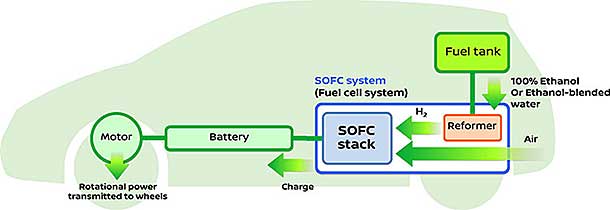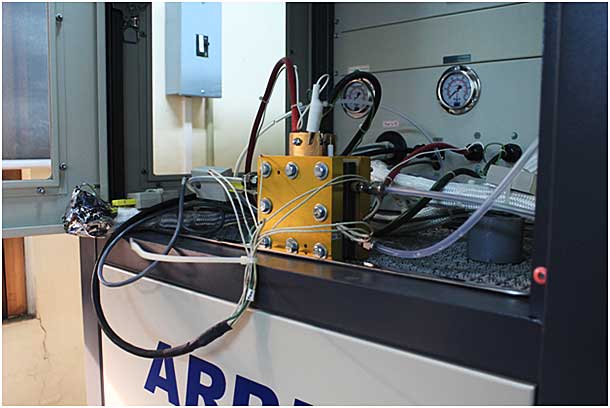
In the past few weeks, two major stories broken about the use of ethanol to power fuel cells. Does this mean that ethanol plus FCEVs will take over the market?
On June 14, 2016, Nissan announced that they were developing a Solid Oxide Fuel-Cell (SOFC) vehicle that runs on bio-ethanol (see picture at top).
According to Nissan, “The new system – a world first for automotive use – features an e-Bio Fuel-Cell with an SOFC power generator. SOFC is a fuel cell utilizing the reaction of multiple fuels, including ethanol and natural gas, with oxygen to produce electricity with high efficiency …
“The e-Bio Fuel Cell generates electricity through the SOFC (power generator) using bio-ethanol stored in the vehicle. The e-Bio Fuel-Cell uses hydrogen transformed from fuel via a reformer and atmospheric oxygen, with the subsequent electrochemical reaction producing electricity to power the vehicle.”
The downside is that this Nissan vehicle won’t be zero emissions. It will use a reformer (I’ve talked about this several times in the past, please see link below) and will emit some CO2. Nissan counters this saying that the sugar cane or corn grown to supply the ethanol will serve as a “carbon sink” and thus the vehicle will achieve a “Carbon-Neutral Cycle.”
Now the other story to break was about a group of researchers at University of Santo Tomas in the Philippines have created a Direct Ethanol Fuel Cell (DEFC) which one day may power cars (see photo below).

According to lead scientists Dr. Bernard John Tongol, “Ethanol is a renewable resource that can be produced from agricultural waste. This means that as long as there is a supply of ethanol, the fuel cell will continue to supply energy. Dr. Tongol said that, compared to other chemicals commonly used as fuel for fuel cells such as methanol and hydrogen, ethanol is less toxic and can be handled more easily.”
More research will be conducted on non-precious metal catalysts in the near future for the DEFC.
Ethanol may be an attractive choice for some since in the U. S. there is already infrastructure in place. According to the U. S. government’s Alternative Fuels Data Center, there are currently 2,800 ethanol stations located in the U. S.
My bet is still on hydrogen fuel cell vehicles. These zero emissions vehicles are not dependent upon a carbon sink to remain carbon neutral, nor do they need a reformer. Unlike the DEFC, hydrogen fuel cell technology is proven and it is here, now. I see ethanol + fuel cell vehicles as possible transitional technology or technology that will add another type of green electric car into the future mix of FCEVs, BEVs, Plugin Hybrids, etc.
References
https://www.hydrogencarsnow.com/?s=reformer
http://nissannews.com/en-US/nissan/usa/releases/dcbe806e-6c8d-4079-a7c9-dd21a590b779?la=1
http://www.thedrive.com/tech/4053/has-nissan-solved-the-biggest-problem-with-fuel-cells
http://www.afdc.energy.gov/fuels/hydrogen_locations.html